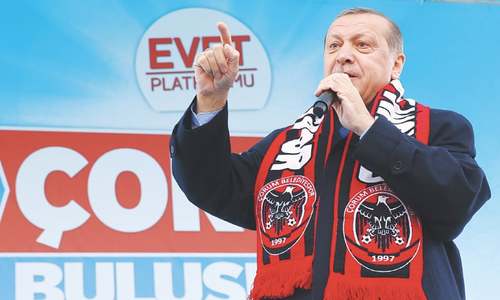Turkish President Recep Tayyip Erdogan on Wednesday called snap elections in the country for June 24, bringing the polls forward by over a year-and-a-half to sharply accelerate the transition to a new presidential system.
Erdogan's announcement upended the political timetable in Turkey, which had been set to vote in simultaneous presidential and parliamentary elections on November 3, 2019.
The elections are especially significant as afterwards a new executive presidency — agreed in a 2017 referendum and denounced by critics as giving the president authoritarian powers — will come into force.
The new timetable means that Turkey will also vote in the polls under the state of emergency imposed since the July 15, 2016 failed coup aimed at ousting Erdogan. The authorities agreed this week the emergency should stay in place for another three months.
'Overcome the uncertainties'
Erdogan made the announcement in an address at his presidential palace after meeting Nationalist Movement Party (MHP) chief Devlet Bahceli who the day earlier had urged early elections.
“As a result of consultations with Mr Bahceli, we decided to hold elections on June 24, 2018, a Sunday,” said Erdogan.
Bahceli stunned Turkish political observers on Tuesday when he urged the government not to wait for November 2019 to hold the presidential and parliamentary elections, suggesting the polls be held on August 26, 2018.
But the date announced by Erdogan is even earlier and will precipitate an intense election campaign as opposition parties seek to challenge his grip.
The MHP chief's intervention surprised commentators since the government led by Erdogan has repeatedly insisted there will be no early elections.
Erdogan said the authorities would have preferred to “grit our teeth” and wait until November 2019 but the situation in neighbouring Iraq and Syria “made it essential for Turkey to overcome the uncertainties ahead as soon as possible".
Turkey is pursuing a cross-border operation inside neighbouring Syria, which has been wracked by a seven-year civil war, and earlier this year took the Kurdish militia-held Syrian town of Afrin.
Erdogan said he wanted to hasten the move to a new presidential system agreed in the April 16, 2017 referendum which will see the office of prime minister eradicated and a new vertical power structure established under the presidency.
“After April 16, Turkey is still ruled by a system that we can consider old,” he said. “The malaise of the old system can be seen in every step we take.”
'Sign of weakness'
The Turkish lira, which has lost seven per cent against the dollar over the past year, responded positively to the news, climbing 1.1 per cent with investors gladdened over the end of uncertainty over the poll date.
But Fadi Hakura, Turkey expert at London-based think tank Chatham House, told AFP that the authorities were keen to hold the elections before any further deterioration in the economy.
“This early election drive reflects the worsening economy that Turkey is going through. It, therefore, demonstrates a sign of weakness on the part of the (ruling party) leadership,” he said.
While growth in Turkey was 7.4 per cent in 2017, double-digit inflation, a wide current account deficit and the need for debt restructuring at top companies could be harbingers of trouble ahead.
The polls will give Erdogan, 64, a chance to extend his stay in power with a new-five year mandate, after already serving 15 years in power as premier and then president.
His closest challenger will be the main opposition secular Republican People's Party (CHP) led by Kemal Kilicdaroglu. The pro-Kurdish Peoples' Democratic Party (HDP) has been weakened by the arrests of its most prominent figures.
“We are ready as if the elections were scheduled for tomorrow,” said CHP spokesman Bulent Tezcan.
But Tezcan said Erdogan had “no right” to hold elections under the state of emergency, urging parliament to lift the measure immediately.
Meral Aksener, the head of a new nationalist formation, the Iyi (Good) Party, which split away from Bahceli's MHP to protest his alliance with Erdogan, said it was the “most prepared party” and announced she would stand for the presidency.
Erdogan's religious-rooted Justice and Development Party (AKP) has established a formal alliance with the MHP to fight the elections, in the hope of sweeping up conservative votes.
MHP leader since 1997, Bahceli is seen as a kingmaker in Turkish politics.
He prompted the 2002 snap polls that brought the AKP to power and the AKP has ruled Turkey ever since.














































